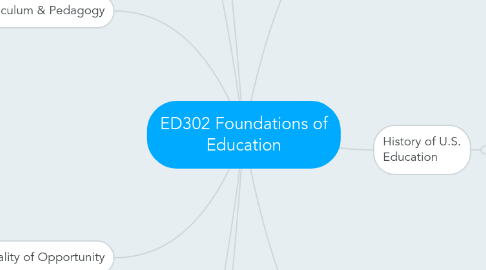
1. Sociology of Education
1.1. relationship between school and society
1.1.1. 1.shape children's perception of the world by processes of socialization
1.1.2. 2.shape students' perceptions and consciousness
1.1.3. 3.influence the social, economic, and cultural differences of children
1.2. Three effects of schooling on individuals
1.2.1. 1.leads to greater knowledge and social participation
1.2.2. 2.higher education level can lead to higher income levels
1.2.3. 3.is believed to open doors of opportunity
2. Philosophy of Education
2.1. generic notions
2.1.1. realist believe that not only ideas are real but also material world or matter is real
2.2. Key researchers
2.2.1. Two of the primary researchers are Francis Bacon and John Locke
2.3. goal of education
2.3.1. to help students to become productive citizens
2.4. Role of the teacher
2.4.1. teachers should be steeped in the basic academic principles and be able to transfer their knowledge to students
2.5. Curriculum
2.5.1. basics: Science, math, reading, writing, humanities
2.6. method of instruction
2.6.1. lecture, Question and answer
3. Curriculum & Pedagogy
3.1. Historical Curriculum Theory
3.1.1. 1. examines what was taught in schools
3.1.2. 2. present students with the best of what has been thought and written
3.1.3. 3. providing students with a common set of worthwhile knowledge and an array of intellectual skills
3.2. Sociological Curriculum Theory
3.2.1. 1. examines what is taught in schools
3.2.2. 2. View curriculum as a reflection of particular interests in society
3.2.3. 3. believe in not only formal curriculum but also informal and hidden curriculum
4. Equality of Opportunity
4.1. Educational Achievement & Attainment
4.1.1. 1. Students in different social classes have different educational experiences.
4.1.2. 2. A students race has a direct impact on hoe much education he or she is likely to achieve.
4.1.3. 3. Even though women are often rated as being better students than men, in the past they were less likely to attain the same level of education.
4.2. Response to the Coleman study
4.2.1. 1. Differences among schools do make a difference in learning.
4.2.2. 2. Catholic schools seem to advantage low-income minority students.
4.2.3. 3. Eliminating the high level of segregation that remains in the U.S. education system must be focused on in educational reform.
5. Education Inquality
5.1. School Centered Explanition
5.1.1. 1. Genetic differences
5.1.2. 2. Cultural deprivation
5.1.3. 3. Cultural Difference
5.2. Sociological Explanations of Unequal Achievement
5.2.1. 1. Functionalists believe that results should be based on individual differences between students not on group differences.
5.2.2. 2. Conflict theorists believe that the role of schooling is to reproduce rather than eliminate inequality.
5.2.3. 3. Interactionism suggest that one must understand how people within institutions such as families and schools interact on a daily basis in order to comprehend the factors explaining academic success and failure.
6. School Reform
6.1. School Based Reforms
6.1.1. 1. School Choice
6.1.2. 2. Charter Schools
6.1.3. 3. Tuition Vouchers
6.2. Societal, Community, Economic, or Political Reforms
6.2.1. 1. Some states take complete control of local school districts who are not meeting standards.
6.2.2. 2. Some states reward schools who meet their standards
6.2.3. 3. Many states impose sanctions on districts or schools for not meeting standards.
7. Politics of Education
7.1. conservative perspective
7.1.1. 1.school is essential to economic productivity and social stability
7.1.2. 2.policy of returning to basics in education
7.1.3. 3.displine, moral standards and values
7.2. traditional vision
7.2.1. 1.schools pass on the best of what was and what is
7.2.2. 2.schools pass on to students hard work, family unity, and individual unity
7.2.3. 3.schools necessary to the transmission of traditional values of U.S. society
8. History of U.S. Education
8.1. The Rise of the Common School
8.1.1. 1.first teacher training school
8.1.2. 2. lead to first state board of education
8.1.3. 3.free publicly funded elementary schools
8.2. Conservative interpretation of U.S. education
8.2.1. 1. return to traditional Western curriculum
8.2.2. 2.thinks that universities have watered down curriculum
8.2.3. 3.blames public schools for valuing skills over content
9. Schools as organizations
9.1. Governance
9.1.1. Senators
9.1.1.1. Richard Shelby, Jeff Sessions
9.1.2. House of representatives
9.1.2.1. Robert Aderhot 4th District
9.1.3. State School Board Rep
9.1.3.1. District 6- Cynthia Sanders McCarty
9.1.4. Local Superintendent
9.1.4.1. Cullman County- Shane Barnette
9.1.5. local School Board
9.1.5.1. Cold Springs- Wendy Crider
9.2. comparison to one country
9.2.1. France has a much more centralized education system when compared with the U.S. system. Their system has two public systems, one for ordinary students and one for elite students. Their goal is to produce only a small number of highly qualified intellectuals.
